
Queerty’s David Reddish met up with Garrard Conley at the Toronto International Film Festival to talk about Boy Erased, the new film based on his memoir about his youthful experience at a toxic gay conversion camp. It turned out to be one of the most emotional interviews he’s ever done.
The film boasts a talented cast, including Lucas Hedges, Russell Crowe, Nicole Kidman, Troye Sivan, and Joel Edgerton, who also took on screenwriting and directing duties.
Boy Erased opens in cinemas November 2.
How’s the festival?
How about we take this to the next level?
Our newsletter is like a refreshing cocktail (or mocktail) of LGBTQ+ entertainment and pop culture, served up with a side of eye-candy.
I’m very excited to talk to queer publications. It’s such a different feeling.
I can only wonder what everyone else will ask.
Oh my God, well, I’m not going to rat out everyone, but you can imagine?
Yeah, I can.
It’s insane, yeah. I mean, I’m never in this world. I’m a writer, so I’m not usually doing this sort of stuff.
You’ve done a lot of work to stop conversion therapy, stopping anti-gay prejudices on a global scale.
We’re hoping.
At the same time, this is such a personal work for you.
I mean, I had so many anxieties. First of all, with the book, I stayed up almost every night worrying about how my family would be portrayed, and whether or not people would think we’re just a bunch of hicks and we’re crazy.
I would imagine so given the setting.
Which, you know, it’s partially true. So I worried about that, and then this, with Joel taking over the story, you know, he’s a straight man, so you’re sitting there thinking, “What’s he going to do?” But I’d actually seen him in Loving [a film about Mildred & Richard Loving, the interracial couple that sued and brought an end to miscegenation nationwide] and on the press tour—I was very surprised to see that he was equating marriage equality to that fight, for tolerance for interracial couples. And I just loved that.
Loving is terrific. I definitely see the parallels.
So already, I was like, “He’s an ally, but I’m still nervous.” On our first meeting, Joel actually said that he wanted to meet with survivors. I mean, obviously I’m one of them, but he wanted to meet with different survivors as well. He listened to all their stories, and I just thought, “Ok, maybe it’s time to give this guy a chance because he seems to be a true ally.” That being said, there were still a few red flags for me in even deciding to turn this into something so pop cultural. One of them is like, We do have a lot of sad queer stories out there.
But isn’t that also honest to the subject?
We’re constantly tortured in film. And so I didn’t want to sort of do that unless there was a real reason for it. And I mean, right after the book was published, there were so many emails from people who were still struggling—not just from the US, but I mean I got emails from people who were like suicidal in Hungry, in Budapest who had managed to hear about my story. It showed me that this was something that actually just needed to be aired out in public. And as ugly as it is for us to do so—I mean, half of us are going to be in tears about this film, and the other half is going to be like, “Oh God, not again.”

Films portrayed queer people so tragically for so long that the audience is exhausted.
And I get that, I totally do. I think we need an abundance of stories. I think we need to not just do the same stories. But I did feel like—first of all, this story does something a little bit different, which is to shame the parents. It really shows, I think, a path, almost like a handbook for parents who really messed up. It’s like, “Ok, that’s how Nicole [Kidman] did it in the movie, so maybe that’s what I need to do.” So there was that aspect. Then I also just thought, you know, this is also just such an atrocity that is still going on every day. And I just, I desperately felt that this needed to be out there. That said, it still terrifies me a bit—the reception of the film. And I hope that it does more good than harm because it is very triggering.
We’ve had some great positive queer-themed films this year. And I think this is a good counterbalance to something like Love, Simon.
I did love it.
It’s adorable. So for this film, were you on set during filming?
Yeah, I was there three different times. Honestly, the best part of being there—they recreated all of the facility that I attended. They had a 270-page handbook.
The “dog” handbook [so named because of the frequent error misspelling “God” as “dog”]?
A complete facsimile and that [error] was actually in there. And it was completely crazy. It was crazy the amount of detail. Joel was very diligent about doing research and talking to a lot of survivors. So walking on that set was like a slap in the face, because it just felt like I was back there. But then you’ve got Lucas Hedges standing in front of you, and you’re like, “what is going on?” But Lucas, I think, the way I survived that set was Lucas.
Really?
So we met right before he decided to do the role. He was very forthcoming about his own journey; you know, he did the New York Magazine piece. So he told me a little bit of that. Then he showed me his copy of my book, which was marked up on every page. And like, we developed a real friendship from that. And he was so kind. Every worry I had dissipated because this guy is so sensitive and so real. He’s never going to lie to you. So when we were on set, I would just look at Lucas and Lucas would look at me, and we’d be like ok, This is really tough. But we trusted each other.

The film took me places in my own past that I don’t go, I don’t like to go. And I wasn’t expecting it so I was a wreck after. I assume you’ve seen a full cut?
Yeah at Telluride [the Telluride Film Festival, where the film had a world premiere] we watched it through, with Nicole behind me giving me a back massage!
Oh my gosh…
She was really nervous for me.
That’s surreal.
She was really nervous, so started giving me this back massage, and I’m like watching my own rape, getting a massage from Nicole Kidman. I was like, “Something went awry here…”
That’s weird, even for Hollywood.
She’s wonderful. She was very concerned about me watching it through with an audience. But I loved it.
I mean, it’s got to be rough to watch though.
Very.
[Deep sigh.]
There are parts at almost every screening where I end up having a totally different emotional reaction that I was not expecting.
How so?
Well, you prepare yourself for the rape sequence, or for the abusive language. I don’t always prepare myself for, you know, watching my mom, or a version of my mom, dealing with it as well. And the last screening I saw, I started really crying when Nicole goes in and she sees the list of moral inventories, and she just falls over on the couch. It just really got to me because I thought, that’s exactly what my real mother did. Like, she was actually in that hotel room and I never saw it. But this is what it looked like.
So what is your relationship like with your parents today?
Well, mom is coming in today.

That will be fun.
She’s super supportive. She’s a PFLAG mom now. She’s really intense. If anyone says anything bad about LGBT people, she’s going to bark at them. My dad is very complicated. We worked really hard to make sure that it was not sugar coated—his stance that he still has. He still runs a church that has 150 members in the middle of Mount Home, Arkansas. And they’re very conservative. I can’t speak to his own, personal journey with this, but I would say, that if he were to overtly say something in support of this, he would lose his entire congregation. I’m sort of like, you know, we have fights. A lot.
Related: Rami Malek as Freddy Mercury, and 12 movies we can’t wait to see this year
I’ve gotten some flack for continuing to love my father, which I think is really funny. You don’t choose who you love. But people are saying I have Stockholm Syndrome, or there’s something wrong with me. But I’m really stubborn, which I don’t think people realize. I’m here to win it, I’m here to win this battle. My dad has the ear of 150 people in that town. That’s an important ear to continue whispering in to. And in addition to that, I think that I never lose hope that the rest of the country can truly change on the subject. I know it’s strange to sometimes be tip-toeing around bigots.
[Laughter]
Well, I mean, he’s also your dad. And if you’re stubborn, I’m guessing that’s where you get it.
Yeah, I do. I go to that church once a year usually.
Does your husband go with you?
No, not yet. I don’t want to subject somebody else to it.
[Laughter]
But I mean, I’m a privileged person in some ways. I’m white, I can go into these spaces, and I can say, “Hey, you just said something racist. Let me explain to you why that’s harmful.” And I think it’s our responsibility especially right now if we have the energy to go back into these places, to say, “Hey, this is what you’re saying, and this is why you’re wrong.” Not in a condescending way always, because that’s never going to work. It’s to say “This is my experience, these are my friends as well, and you’re saying these things about us, and it’s really hurtful, and we’re human beings.” So I show up to church, and I’m just sitting there like what are you going to do about it? And Southern hospitality makes it impossible for them to say anything to my face.
[Laughter]
I would imagine your parents had a positive reaction when you told them “Russell Crowe and Nicole Kidman are going to play you.”
My dad had a very complicated reaction.
What did he do?
Russell Crowe showed up at his church.
Oh sh@t! Seriously?
Like, without any warning. He flew in on a private jet, showed up at his church because he wanted to get into character. And he’s a very dedicated actor, a bit insane, but I guess that’s what’s required to do that kind of role. You know, he talked with dad and they were texting for a long time, which is super weird. You know you hear from your dad “Oh, I’m texting with Russell today.” Like, what are you supposed to do with that information? The man who’s playing the man who sent you to conversion therapy is texting? So he was really impressed, but also like, I dunno, this means it’s going to be everywhere. Mom said that she secretly saw him watching Gladiator one night [the film for which Crowe won his Oscar], which I loved. I think dad really thinks he’s Russell Crowe now. From Gladiator, like that version of Russell Crowe.
[Laughter]
And my mom believes she’s Nicole Kidman now. But what’s funny is Nicole Kidman can’t actually hold a candle to my mom, you know, when it comes to stage presence. I think when my mom gets up on stage, it’s going to be like uh oh. She’s larger than life.

So, I’m from the Midwest, so we’re like cousins with Southerners. So I knew a lot of people like your folks.
Isn’t it funny? People are like, “It’s so unrealistic, that wig.” And I’m like, ummm…
There was a woman I grew up with, and she was actually from the south and moved to Illinois where I lived. And the entire time I’m watching the movie I’m going, “Oh my God, it’s Mrs. Allen. Oh my gosh.” I know everything about this woman already, you know, why she picked that blazer…
Totally, right?
What she used to do in high school. And the nails, oh lord, the nails…
The nails were so great. Actually, mom was like “I’d never have those nails.” She loved almost every outfit, but there were like two where she was like “uh-uh.” She didn’t like the leopard print.
The leopard print dress is a little extreme.
She was like “I’ve done leopard print, but never like that.”
[Laughter]
That’s funny. Ok, so before we further derail into your mother’s fashions…
Sorry. That’s what’s going to happen, like, always.
No, no, no, it’s great. But I have to ask, Vic—John Smid in real life—who was the head of Love in Action. Have you seen him? Have you had contact with him?
So I brokered a donation of his documents to the Smithsonian.
Oh wow. Ok…
So I basically said to him, “John, we have a chance to make history here. I know it’s complicated, but this is the right thing to do.” And so he did the right thing, and he donated every record from Love in Action. Every record is now part of the permanent Smithsonian collection. It’s so exciting.
Wow. That’s a scary archive.
We actually made history by doing that. That’s the kind of stuff that excites me way more than the movie, actually. The movie gives us a chance to do that. So I have been in contact with him for that, but we’re not besties or anything.
No. That actually would be Stockholm Syndrome.
I still think that he should maybe spend the rest of his life apologizing to people for what he did because he is responsible for people’s deaths. But, that being said, I think everyone deserves happiness. So I’m not bitter about it. But you’re never going to be able to trust somebody like that.
Related: Boy Erased’s Joel Edgerton on the violence of ex-gay therapy and the potential for redemption
That only makes sense.
I mean, it’s impossible. But I do actually—and this is not a sarcastic comment—I do wish him well. I just can’t be the person to wish him well in person. It’s tough. Oh, and he also cooperated on a podcast that we’re doing with the producers of Radio Lab. We’re doing a four-part podcast, and he’s sort of a showcase at the end because they ask some really tough, hard-hitting questions about how he feels about everything. So, that’s exciting. He’s doing all the right things.
That is good. I mean, I can’t tell you how upset, how angry I was watching the film, and how hurt I felt watching because I know people that have been through conversion therapy. Thank God I never had to do it…
But you probably had a version of it…
I grew up in a religious household.
So that’s conversion in a sense.

It was not a good time around the house when I came out. And my parents are great now. They’re PFLAG parents also.
That’s fantastic. That’s awesome.
But, you know, the pain of it is really raw. And so, I guess I have to ask you this man-to-man…
[Slight pause. I lean forward on my chair, tears welling up.]
How do you let it go? How do you forgive…these people?
I mean, at a certain point, I was so suicidal that…Oh my God, you’re going to make me start bawling.
I’m sorry! Sorry…
No, no, it’s a great question.
[He takes a deep breath and wipes his own tears from the corners of his eyes.]
I was so on the edge, and I had so many feelings: self-hatred, hatred for everyone. I just wanted the universe to explode or something. I was so mad. And I just thought, what’s the easiest way out of this? How do I get out of this moment? And the answer was to intellectualize it and to figure out what the f@ck happened.
And the only way you do that is to not hate them. Because if you hate them, you’ll never see what happened. You’ll never understand the movement. And let me say, I am in it to end this. Not only that but to really show how this is a part of a much larger spectrum of bigotry in the country. What you went through, too. And I want to win it so badly, that I will do anything to make sure that happens. And one of those things is to properly understand why somebody like John Smid did what he did.
There’s no other way.
If you just hate, you’ll never see the real evil.
Boy Erased opens November 2.


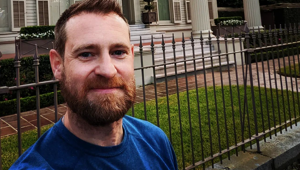
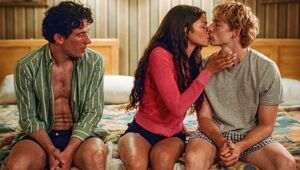

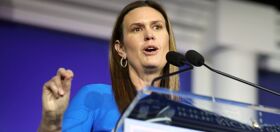

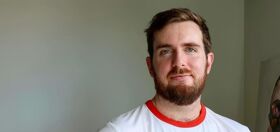
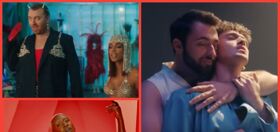
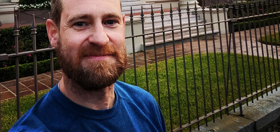

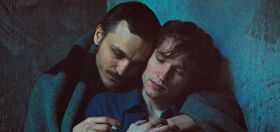
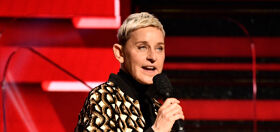

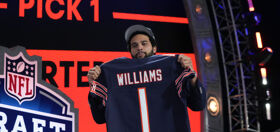




Kangol
Excellent interview. These exchanges are one of Queerty’s fortes.
Lacuevaman
very Catholic. hate the sin, but love the sinner.